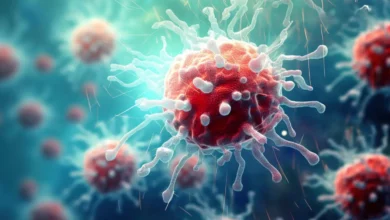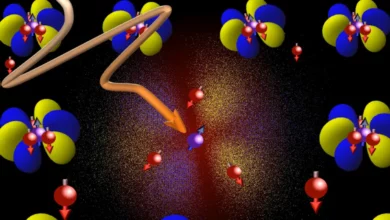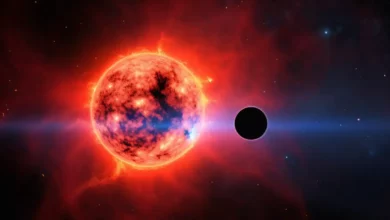Latest Articles
-
Aug- 2023 -3 AugustCancer

Surprising Finding: Scientists Discover New, Unexpected Mechanism of Cancer Cell Spread
USC researchers discovered that under stress, the protein GRP78 migrates to a cell’s nucleus, altering gene activities and promoting cancer cells’ mobility and invasiveness. This novel finding, which may facilitate the development of new therapeutic approaches, implies a shift in cell biology understanding and broad implications for cancer treatment strategies. Researchers at the Keck School of Medicine of USC found that a key protein can move to the nucleus of cancer cells when they are stressed, reprogramming the cells to become more migratory and invasive. A surprising finding from USC unveils crucial insights into the way cancer cells spread, offering…
Read More » -
3 AugustQuantum Physics

Puzzling Quantum Phenomenon: When Electrons Slowly Vanish During Cooling
Lead Image: Composed of localized and mobile electrons, here broken up by an ultrashort light pulse. Credit: University of Bonn Scientists observe an effect in the quantum world that does not exist in the macrocosm. Researchers at the University of Bonn and ETH Zurich have conducted an in-depth study of unique phase transitions in certain metals. Their findings provide a better understanding of quantum physics and potentially advance the field of quantum information technology. When they are cooled below a certain critical temperature, many substances change their properties. For example, such a phase transition occurs, when water freezes. However, in…
Read More » -
Jul- 2023 -31 JulyAnthropology

New Hybrid Hypothesis Shakes Up Indo-European Language Origin Theories
Lead Image: An international team of linguists and scientists has proposed a new hybrid hypothesis for the origin of Indo-European languages based on a comprehensive analysis of 161 languages. Their findings suggest an initial origin south of the Caucasus, with subsequent branching northwards onto the Steppe, and estimate the Indo-European language family to be approximately 8100 years old, contradicting the previous Steppe and farming hypotheses. Linguistics and genetics combine to propose a new hybrid theory regarding the origin of the Indo-European languages. For over two centuries, the question of where the Indo-European languages originated has been a hotbed of contention.…
Read More » -
30 JulyAstronomy

Astronomers Shocked by “Weird” Phenomena: Hubble Sees Evaporating Planet Getting the Hiccups
Lead Image: The exoplanet AU Mic b, in a young planetary system orbiting red dwarf star AU Microscopii, displays unpredictable atmospheric loss. Astronomers are studying this peculiar phenomenon to understand planetary survival and potential habitability in such extreme environments. Rambunctious Star Pummels Young World with Torrential Winds and Blistering Radiation Life around an ill-tempered red dwarf star is no fun for accompanying newborn planets. Call it a baptism of fire. Entangled magnetic fields cause a red dwarf to spit out “super-flares” that are 100 to 1,000 times more powerful than similar flares seen on our Sun. That is coupled with…
Read More » -
29 JulyEnvironment

Nano Nightmare: Billions of Nanoplastics Released When Microwaving Baby Food Containers
Lead Image: Kazi Albab Hussain (left) holds his son while removing a plastic container of water from a microwave. Hussain and colleagues at the University of Nebraska–Lincoln have found that microwaving such containers can release up to billions of nanoscopic particles and millions of microscopic ones. Credit: Craig Chandler, University of Nebraska–Lincoln Exposure to particles from baby food containers kills up to 75% of cultured kidney cells. The fastest way to heat food and drink might also rank as the quickest route to ingesting massive quantities of minuscule plastic particles, says new research from the University of Nebraska–Lincoln. Experiments have…
Read More »










